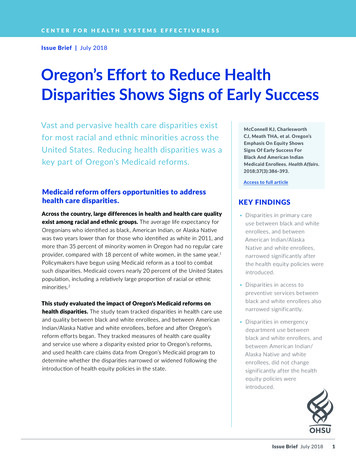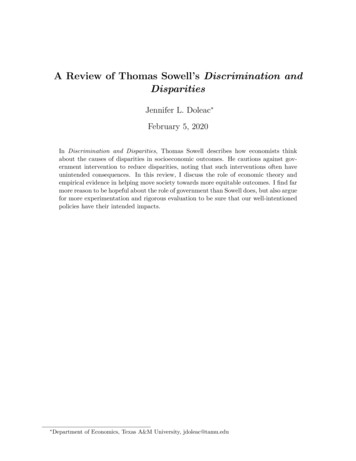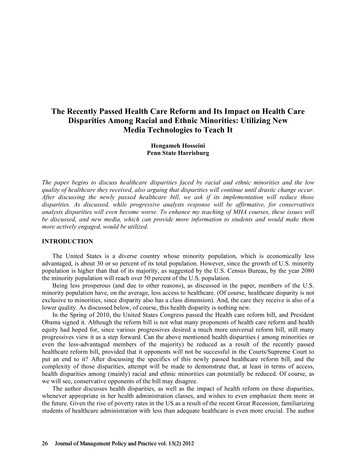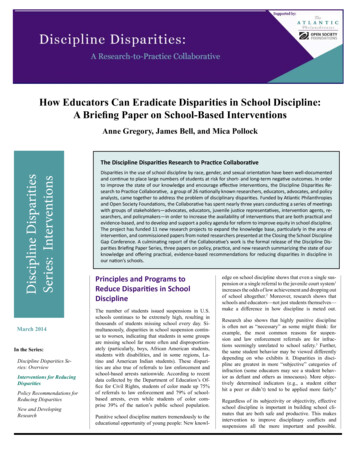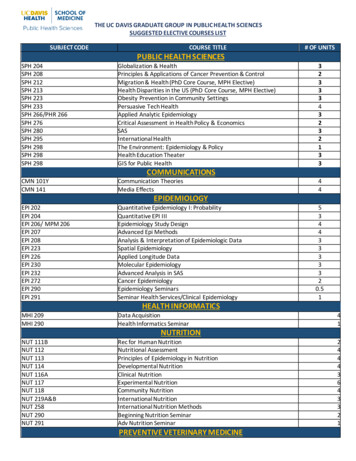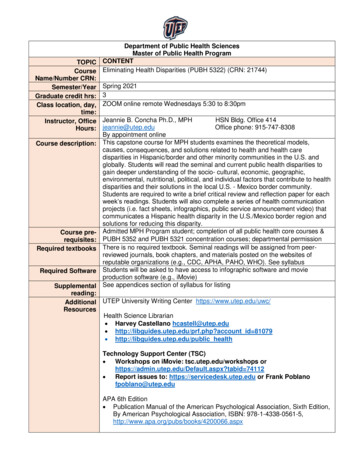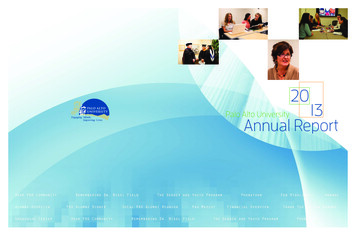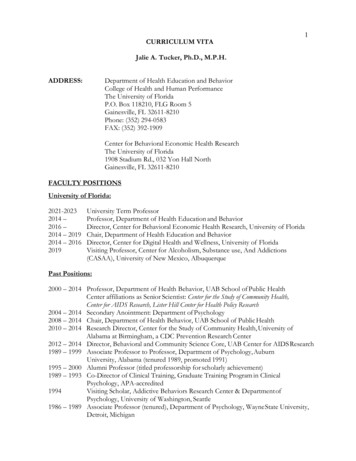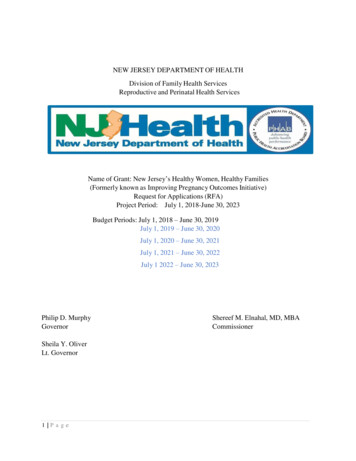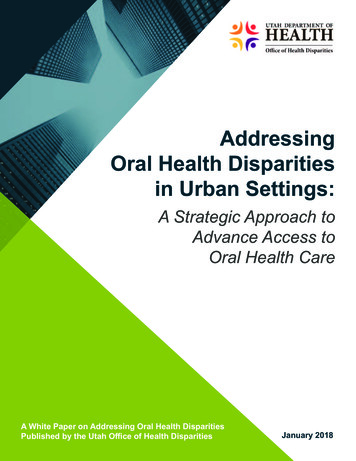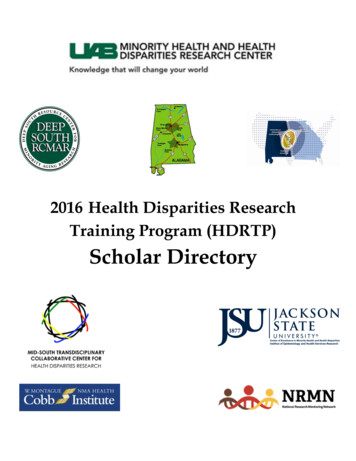
Transcription
2016 Health Disparities ResearchTraining Program (HDRTP)Scholar Directory
2016 Health Disparities Research Training Program (HDRTP)SCHOLAR DIRECTORYDaniel Abugri, PhDAssistant ProfessorDepartment of Biology & ChemistryTuskegee Universitydabugri@mytu.tuskegee.eduHDRTP 2016MSM/TU/UAB Cancer PartnershipDr. Daniel Abugri received his B.Sc. (Hons.) in Applied Chemistry with Enivironmental Science from the University for DevelopmentStudies, Navrongo, Ghana, and M.Sc. in Chemistry with concentration in Analytical Biochemistry and Ph.D. in Integrative Bioscienceswith concentration in Biochemistry and Molecular Parasitology from Tuskegee University, Tuskegee, USA. Dr. Abugri’s current researchencompasses drug discovery from natural products, medicinal plants, ethnomedicine and ethnopharmacology, molecular parasitology,understanding the biochemistry of host-parasite interaction and parasite-drug interaction, anti-cancer natural products discovery,antimicrobial agents against bacteria and fungi, antimalarial and anti-toxoplasmosis agents development, vaccine development,biochemical method development. Furthermore, Dr. Abugri works on natural sources of Lipids, Proteins, Enzymes and Peptides, Dyes,indicators, antioxidants, and anti-inflammatory agents which can be beneficial in terms of cost, availability and user safety and theenvironment. Dr. Abugri has published over 20 papers in many high impact peer reviewed Journals, two books and two bookschapters. He also serves on editorial board and a technical reviewer for high impact Journals in Chemistry, Food Chemistry, Nutrition,Food Science, Biochemistry and Infectious Diseases. His goal is to use ethnomedicinal approach to overcome health disparities incancer and other infectious diseases globally.Aamir Ahmad, PhDAssistant ProfessorMitchell Cancer Institute, Oncologic SciencesUniversity of South Alabamaaahmas@health.southalabama.eduHDRTP 2016U of South AlabamaDr. Aamir Ahmad joined the ‘Health Disparities in Cancer’ Program at the University of South Alabama’s Mitchell Cancer Institute(USAMCI) earlier this year. He earned his PhD from AMU, India and completed his post-doctoral training at National Cancer Institute,National Institutes of Health, Bethesda, MD. At USAMCI, he is developing a research program focused on racial disparityin lung cancer because this represents a problem that has not been adequately addressed, despite convincing statistics supportingsignificant differences in the mortality in African American minorities, compared to White Caucasian American populations. Dr. Ahmadaims to utilize his experience in epigenetic regulation of cancer metastasis and drug resistance towards understanding the molecularbasis of racial disparity in lung cancer.Daniel Chu, MDAssistant ProfessorUAB School of Medicine, Surgerydchu@uab.eduHDRTP 2016MSM/TU/UAB Cancer PartnershipDaniel I. Chu, MD, is an Assistant Professor in the Division of Gastrointestinal Surgery at the University of Alabama at Birmingham.He completed his undergraduate at Yale and medical school at The Johns Hopkins School of Medicine. After general surgery residencyat Boston University, he completed a colon and rectal surgery fellowship at the Mayo Clinic. His clinical practice spans the spectrum ofcolorectal diseases and his research interests focus on identifying, understanding and reducing disparities in surgery.1
2016 Health Disparities Research Training Program (HDRTP)SCHOLAR DIRECTORYSarah Dilley, MD, MPHFellowUAB School of MedicineGynecology Oncologysdilley@uabmc.eduHDRTP 2016MSM/TU/UAB Cancer PartnershipDr. Sarah Dilley is a Fellow in the Division of Gynecologic Oncology at UAB. Dr. Dilley earned her undergraduate degree in Psychology fromEmory University in 2006, after which she stayed at Emory to work on a maternal substance abuse research and outreach project. She thenmatriculated at Indiana University School of Medicine where she graduated in 2012. In between her 3 rd and 4th years of medical school, sheearned a Master of Public Health degree from Harvard University, with a concentration in Family and Community Health. During medicalschool she also volunteered in a women’s hospital in Eldoret, Kenya, and was an Albert Schweitzer Fellow with a project focusing on access towomen’s healthcare for women in transitional housing. After graduating from medical school she completed her residency in obstetrics andgynecology at Oregon Health and Science University in Portland, OR. As a gynecologic oncology fellow she is interested in improving thedisparities in the incidence, outcomes and quality of care for patients with gynecologic cancers, with a focus on HPV-related cancers.Deborah Ejem, PhDPost-Doctoral FellowUAB School of Nursing & Dept of Sociologytejem@uab.eduHDRTP Scholar 2016NRMNDr. Deborah Ejem is a postdoctoral scholar in the School of Nursing at University of Alabama at Birmingham. She earned a B.S. inBiology (minor in Chemistry), a B.A. in Sociology, an M.A. in Sociology, and a Ph.D. in Medical Sociology all from the University ofAlabama at Birmingham. Currently, she examining the associations among reciprocal (dyadic) relationships, family caregiver burden,spirituality, patient quality of life (QoL) and symptom outcomes in older African American heart failure patients and their familycaregivers.TJ Exford, PhD, MEdAssistant ProfessorCollege of Education, Health, Physical Education &RecreationAlabama State Universitytjexfordd@gmail.comHDRTP 2016ASU/UAB Cancer PartnershipTJ Exford, PhD, is currently an Assistant Professor of Exercise Science in the Health, Physical Education and Recreation Departmentat Alabama State University. Dr. Exford earned her Ph.D in Exercise Science from Auburn University, School of Kinesiology with a focalconcentration in exercise physiology. Dr. Exford has keenly pursued the integration of mindfulness meditation practices, in physical andhealth education since her own path of personal growth and embodiment of eastern contemplative mediation began that sameintegration. Her research has focused on the effects of a Mindfulness Based Stress Reduction (MBSR) program on increasingmindfulness and its impact on perceived stress in college students. More recently, she has become interested in the relationshipbetween mindfulness, physical activity, and health disparities in minority populations. Dr. Exford is interested in developing anintervention integrating mindfulness based stress reduction (MBSR) partnering with conventional healthcare in a clinical or communitybased setting to address cancer and cardiovascular health disparities in minority populations to include a focus on the role ofparticipation in physical activity as a survivorship behavior. It has been shown that mindfulness may moderate the relationshipbetween intrinsic motivation and physical activity. While research has revealed that MBSR interventions have led to a reduction inlevels of depression, anxiety, and fear of recurrence along with increased energy, physical functioning, and physical role functioning incancer survivors.2
2016 Health Disparities Research Training Program (HDRTP)SCHOLAR DIRECTORYAnne Halli-Tierney, MDAssistant ProfessorCollege of Community Health Science,Department of Family MedicineUniversity of Alabamahalli002@cchs.ua.eduHDRTP 2016RCMARDr. Anne Halli-Tierney is an assistant professor in the department of family medicine at The University of Alabama's College of Community HealthSciences. She works with medical education at levels of learning from undergraduate to post graduate students, and focuses on interdisciplinarymodels of education. Her research interests include interdisciplinary educational models and their effects on students' learning, the impacts ofinterdisciplinary health care models on older adults' wellbeing and quality of life, and the quality of care provided in interdisciplinary settings.Bertha Hidalgo, MPH, PhDAssistant ProfessorUAB School of Health Professions, Epidemiologybhidalgo@uab.eduHDRTP 2016NRMNDr. Bertha Hidalgo an Assistant Professor in the Department of Epidemiology, Associate Scientist in the UAB Nutrition Obesity ResearchCenter and Faculty Scholar in the Center for the Study of Community Health. She holds degrees from Stanford University, the University ofSouthern California and the University of Alabama at Birmingham. Her research focuses health disparities related to cardiometabolic diseases,with a special focus on Latino populations and epigenomics. She has received research funding from the Robert Wood Johnson FoundationNew Connections Program to investigate whether genetic and epigenetic differences exist between subgroups of Latinos for cardiometabolicdiseases (e.g. obesity, cardiovascular disease, type-2 diabetes) by first investigating differences in subgroups of Latino children and obesity inan epidemiologic study. She has also received the 2014 Back of the Envelope award to create a multi-ethnic biorepository for cardiometabolicdiseases. Recently, Dr. Hidalgo became the principal investigator of Epigenomics of Cardiometabolic Disease in Mexican American, a K01award focused on better understanding the genetic and environmental contributors to cardiometabolic diseases among Mexican Americans.Prior to award of the K01, Dr. Hidalgo was a diversity supplement recipient, sponsored by UNC Chapel Hill, to explore genetic heterogeneity inHispanic/latinos with T2D and metabolic syndrome. Her research interests include cardiometabolic diseases, cancer, genetic epidemiology,health disparities and Latino health. Bertha is an active member of several epidemiology and public health professional societies – includingcurrent chair of the Minority Affairs Committee for the American College of Epidemiology - and active in organizations in and around UAB.Carolyn Howard, PhDAssociate Professor, BiologyDirector, JSU Breast Cancer Research LabJackson State UniversityCarolyn.b.howard@jsums.eduHDRTP 2016Jackson State UDr. Carolyn Bingham Howard is an Associate Professor of Biology in the College of Science, Engineering and Technology at Jackson State University(JSU). She earned a B.S. in Biology from JSU in 1981 and earned her Ph.D. in Microbiology from the University of Mississippi Medical Center (UMMC)in Jackson, MS in 1995. Prior to assuming her position as a faculty member at JSU in 1996, she completed a one-year post-doctoral fellowshipappointment at UMMC. Her current research focus is toward identifying a clinically actionable target of a novel and less toxic therapeutic for triplenegative breast cancers (TNBCs). TNBCs are inherently resistant to most available therapies, thereby promoting tumor relapse and recurrence.Preliminary studies conducted in her laboratory indicate that treatment with aqueous extracts of Vernonia amygdalina (VA extracts) decreased TNBCcell proliferation in vitro, and reduced initiation and progression of tumors in vivo. Broad conclusions from her studies will be directly relevant tobetter understanding the importance of prevention strategies and novel combination therapies including VA extracts for insidious forms of breastcancer (BC) that contribute to higher incidence of BC mortality in African-American women. Dr. Howard has published several research articles andsubmitted grant proposals for funding to continue her important work3
2016 Health Disparities Research Training Program (HDRTP)SCHOLAR DIRECTORYSapna Jain, PhDAssistant Professor, ChemistryCollege of Science, Math & TechnologyAlabama State Universitysjain@alasu.eduHDRTP 2016ASU/UAB Cancer PartnershipDr. Sapna Jain is Assistant Professor of Chemistry at Alabama State University, Montgomery, AL. Dr. Jain currently works in the fieldof Nanochemistry and Nanoengineering. This field is complex and multidisciplinary in that it combines expertise in synthetic andanalytical chemistry, materials science, and electrochemistry with specialties in synthesis and in-situ functionalization of hybridinorganic-organic nanoparticles, highly reactive nanoenergetic materials, fuel additives, sensors and detectors. Dr. Jain graduated fromthe world-renowned Indian Institute of Technology (IIT Delhi), where she was also later offered two prestigious postdoctoralfellowships. Upon completing her Master’s degree, Dr. Jain was awarded the gold medal in for her stellar scholastic achievements.Consistently ranked among the premier universities in India, IIT Delhi served as a launch pad for Dr. Jain’s career and she continued touse her interdisciplinary background to develop biosensors for bacterial pathogen detection. Concomitantly, she is working on ways todesulfurize diesel fuel, coal, and other fuel sources by utilizing novel catalysts for biomass conversion. Her work has significantimplications for the future of medicine, fuel production, and even national defense. Dr. Jain has publications in reputed peer reviewedjournals. She has several presentations at international conferences and symposiums. Dr. Jain is an active member of the EditorialBoard for the Journals, Current organic Chemistry and Journal of Nanogenomics and Nanomedicine. She also regularly serves as a peerreviewer for other prestigious international journals. She has also served as judge in technical sessions at the 2013 and 2014 NanoBioSummit meetings, ABRCMS 2016, NSF student chapter reviewer 2016, Alpha Beta Chi abstract reviewer and has reviewed two chaptersof “Physical Science,” a textbook published by Tillery McGraw Hill.Allison Jones, MS, PhDAssistant ProfessorUAB School of NursingAcute, Chronic & Continuing Carearjones3@uab.eduHDRTP 2016RCMARDr. Allison Jones is an Assistant Professor in the Acute, Chronic & Continuing Care Department at the UAB School of Nursing whereshe teaches in the Undergraduate nursing program. She earned her BSN, MSN, and PhD from the University of Kentucky. She has abackground in emergency and trauma nursing with a broader focus on critical care. Dr. Jones is also a Certified Clinical Nurse Specialistin the Adult Acute Care field. Her research focuses on outcomes related to transfusion of stored blood components, including the bloodcollection, preservation, and utilization processes, and how those issues impact patient outcomes. She is interested in exploringtransfusion practices and outcome disparities in patients with major trauma .Robina Josiah Willock, MPH, PhDAssistant ProfessorCommunity Health and Preventive MedicineMorehouse School of Medicinerjosiah-willock@msm.eduHDRTP 2016NMA Cobb Institute/Mid-South TCCDr. Robina Josiah Willock is an Assistant Professor in Community Health and Preventive Medicine at Morehouse School of Medicine(MSM). She serves as a Health Services Researcher with the Study Design, Biostatistics, and Data Management Core of the ResearchCenter for Clinical and Translational Research. She also teaches in several graduate public health courses including HealthCommunication, Academic Writing, and Bridges to Health Equity. In addition to her commitment to teaching and mentoring studentsin the MSM Masters of Public Health program, Dr. Josiah Willock has several years’ experience designing and facilitating communityhealth education efforts and community-based research. Her general research interests center on health communication, riskmessaging and facilitating behavior change in clinical practice and among high disparity populations such as women, ethnic/racialminorities and low health literacy individuals. In her current research Dr. Josiah Willock seeks to delineate the impact of psychosocialfactors and mental health/well-being in disparities in hospital readmission among heart failure patients from vulnerable populations.4
2016 Health Disparities Research Training Program (HDRTP)SCHOLAR DIRECTORYNeeraj Kapur, PhDPost-Doctoral FellowMicrobiology, Biochemistry, & ImmunologyMorehouse School of Medicinenkapur@msm.eduHDRTP 2016MSM/TU/UAB Cancer PartnershipDr. Neeraj Kapur is working as a Post-doctoral Fellow in department of Microbiology, Biochemistry and Immunology at MorehouseSchool of Medicine, Atlanta. Dr. Kapur has completed Ph.D in Molecular Virology and Hepatology from Department of Pathology at AllIndia Institute of Medical Sciences, India. His PhD was focused on determining the molecular mechanisms of attachment and entry ofHepatitis E virus in liver cells. After completing Ph.D., he has accepted postdoctoral position at Morehouse School of Medicine,Department of Microbiology Biochemistry and Immunology. Dr. Kapur’s current research is focused on defining the role of chemokinein cancer and disparity associated with therapeutic and disease outcome.Rachel Lancaster, MDAssistant ProfessorUAB School of MedicineSurgical Oncologyrlancaster@uabmc.eduHDRTP 2016NRMNDr. Rachael Lancaster is an Assistant Professor of Surgery within the division of Surgical Oncology and specializes in breast surgery.Dr. Lancaster became a doctor of medicine after receiving her degree from the University of Alabama School of Medicine atBirmingham in 2010. She completed her residency in General Surgery at the University of Alabama Birmingham in 2015. After surgicalresidency, she completed a Fellowship in Breast Surgical Oncology at the University of California San Francisco. She then returned toBirmingham, Alabama to begin her clinical and academic practice at UAB in 2016. Dr. Lancaster’s research interests include patienteducation and its impact on decision making, breast cancer prevention, impact of disparities on breast cancer prevention and access toappropriate care, and breast cancer treatment outcomes.Jeffrey Lang, MSAssistant Director, Academic EnrichmentClinical Instructor, PsychologyCreighton Universityjeffreylang@creighton.eduHDRTP 2016Creighton UniversityJeff Lang is an Assistant Director in the Health Sciences – Multicultural and Community Affairs (HS-MACA) office providing academicsupport for students in the Creighton University Post-Baccalaureate Program and students in the pipeline programs. The goal of thePost-Baccalaureate program is to recruit and support under-represented students, preparing them for success in medical or dentalschool. He has held this position for six years. Mr. Lang also uses his training in educational psychology to teach ‘Learning How toLearn’ courses with applied strategy instruction in the post-baccalaureate learning laboratory. His research interests are learningstrategies, cooperative learning and the outcomes of post-baccalaureate programs.5
2016 Health Disparities Research Training Program (HDRTP)SCHOLAR DIRECTORYMingli Liu, MD, PhDInstructorMicrobiology, Biochemistry, & ImmunologyMorehouse School of Medicinemliu@msm.eduHDRTP 2016NRMNDr. Mingli Liu is an Instructor at Morehouse School of Medicine, in Atlanta, GA. Her current research focuses on identifying signalingpathways associated with pathogenesis of fatal malaria with the goal of targeting upstream molecules in the development of novelinterventions. Previously, Dr. Liu also conducted research focused on insulin-like growth factor (IGF-1) signaling pathways that mediatecell differentiation and proliferation.Ian McDonough, PhDAssistant Professor, PsychologyCollege of Arts & SciencesUniversity of Alabamaimmcdonough@ua.eduHDRTP 2016RCMARDr. Ian McDonough is currently an Assistant Professor in the Psychology Department at the University of Alabama and is anAssociate of the Alabama Research Institute on Aging. Dr. McDonough received his BS from UCLA in 2006, his PhD from the Universityof Chicago in 2011, and did his postdoc at the Center for Vital Longevity at the University of Texas at Dallas until 2015. He recentlyreceived the Matilda White Riley Early Stage Investigator Honors from the National Institute of Health and was accepted into the highlycompetitive Butler-Williams Scholars Program at the National Institute on Aging. Dr. McDonough’s current research focuses on theneural correlates of memory retrieval and how they differ with old age. More recently, he has also begun to investigate how the neuralcorrelates differ in middle-aged and older adults at risk for Alzheimer’s disease, with a particular focus on racial/ethnic healthdisparities.Hina Mir, PhDResearch AssociateMicrobiology, Biochemistry, & ImmunologyMorehouse School of Medicinehmir@msm.eduHDRTP 2016MSM/TU/UAB Cancer PartnershipDr. Mir received her PhD in Biochemistry from the Maharaja Sayajirao University of Baroda, India. During her PhD she focused ondetermining the role of Poly ADP-Ribose Polymerase and Apoptosis Inducing factor in cell death and development. After completingPhD in 2011 she started investigating the role of Occludin on tight junction regulation as a postdoctoral fellow in the Department ofPhysiology at University of Tennessee Health Science center, Memphis, TN. In 2013, Dr. Mir accepted postdoctoral position in theDepartment of Microbiology, Biochemistry and Immunology at Morehouse School of Medicine and was promoted as ResearchAssociate in 2015 considering her exceptional contribution defining the role of chemokines in prostate and lung cancer. Her currentresearch is focused on decoding the tumor-induced changes in immunological landscape contributing to cancer progression anddisparity in disease aggressiveness and therapeutic outcome.6
2016 Health Disparities Research Training Program (HDRTP)SCHOLAR DIRECTORYFrank Mrema, PhDForestry & Mycology SpecialistAlcorn State UniversitySchool of Agriculturefrmr68@yahoo.comfamrema@alcorn.eduHDRTP 2016Jackson State UDr. Frank Mrema is a Forestry and Mycology Specialist at Alcorn State University - Mississippi Small Farm and Agribusiness Center.He earned his Masters and Ph.D. in Forestry Ecology and Environmental Research from the Swedish University of Sciences (SLU) –Uppsala, Sweden. Frank’s research focuses on the cultivation of medicinal mushrooms and evaluation of their metabolites production.His outreach educational program includes promoting the production of edible mushrooms and consumption of mushrooms aspreventive measures against chronic diseases. Frank has teaching interests in Mycology, Forest Pathology, and Microbial Ecology.Dr. Mrema skills and capabilities will be useful in the Health Disparities Research Training Program especially in exploring more onmedicinal mushroom production as a source of nutraceutical products.Shenika Poindexter, PhDAssistant Professor, BiologyAlcorn State Universityspoindexter@alcorn.eduHDRTP 2016Jackson State UDr. Shenika Poindexter is originally from Indianola, MS. She graduated from Alcorn State University (ASU) with a B.S. in Biology in2007. She then enrolled in the Initiative for Maximizing Diversity Program (IMSD) at Vanderbilt University in Nashville, TN. Aftercompleting the IMSD program, Shenika selected Dr. Christopher Williams as her thesis advisor and has recently defended herdissertation entitled, “Critical Regulators of Epithelial Homeostasis and Intestinal Crypt Regeneration: Identification of NovelBVES/BCAR3 Signaling Complex in EMT and Tumorigenesis and Biological Implications for MTG16 in Stem Cell Function, Proliferation,Apoptosis and DNA Repair”. She received her Ph.D. in Cancer Biology from Vanderbilt in May 2015. Dr. Poindexter is currently anAssistant Professor in the Department of Biological Sciences at ASU. She will teach undergraduate and graduate level Genetics courses.She plans to start an academic research lab at Alcorn that integrates health disparities into current basic research projects .Sola Popoola, MSAssistant ProfessorSchool of NursingTuskegee Universityspopoola@mytu.tuskegee.eduHDRTP 2016RCMARMs. Sola Aina-Popoola, is a Registered Nurse with a Master Degree in Nursing (Auburn University) and presently a PhD candidate atAuburn University College of Education. She has been a clinical nurse for 22 years and a Nurse Faculty for six years. She was selected asHolmes Scholar, 2016. She has three publications out of which two were peer-reviewed articles in both international and nationaljournals. Presently, Ms. Popoola collaborates with other Health care professionals in self-management training education for AdultDiabetes Type 2 clients living in black belt counties of Alabama and working with two others colleges in promoting healthymanagement around Alabama.7
2016 Health Disparities Research Training Program (HDRTP)SCHOLAR DIRECTORYDesiree Rivers, PhD, MSPHAssistant ProfessorCommunity Health & Preventive MedicineMorehouse School of Medicinedrivers@msm.eduHDRTP 2016NMA Cobb Institute/Mid-South TCCDr. Desiree Rivers is an Assistant Professor in the Department of Community Health and Preventive Medicine and faculty in theCancer Research Program at Morehouse School of Medicine. Her research interests include exploring the socio-ecological context ofcancer disparities. Dr. Rivers holds a B.S. in Psychology from Vanderbilt University, a Master of Science in Public Health with aconcentration in Health Care Organization and Policy from the University of Alabama at Birmingham School of Public Health, and a PhDin Health Education from Texas A&M University. Dr. Rivers served as a UAB Lister Hill Center for Health Policy Fellow and aCongressional Black Caucus Fellow during as well as a Diversity Fellow. Dr. Rivers completed a behavioral oncology postdoctoralfellowship at the NCI-designated Comprehensive Cancer Center, Moffitt Cancer Center. Currently, Dr. Rivers is a W. Montague Cobb/National Medical Association Health Institute Fellow. Dr. Rivers has conducted numerous professional presentations, contributed toseveral federally funded research and Centers of Excellence grants, as well as published articles highlighting her research andcommunity engagement experience.Archana Sharma, PhDAssistant Professor, BiologyTuskegee Universityasharma@mytu.tuskegee.eduHDRTP 2016MSM/TU/UAB Cancer PartnershipDr. Archana Sharma is currently working as an adjunct assistant professor in the biology department of Tuskegee University. Sheteaches courses related to cell genetics and molecular biology. She received her Ph.D. degree from Department of Biological Sciences,Auburn University, Alabama in year 2015. She has research experience in area of plant molecular genetics. Her research was mainlyfocused on the gene that controls root growth and shoot gravitropic response of Arabidopsis thaliana. She participated in GROW CELLSCancer Research Project recently and she had the opportunity to explore the effect of various natural food resources on growth ofbreast cancer cells.Wendy Thompson, DrPHAssistant ProfessorSchool of Social WorkJackson State Universitywendy.e.thommpson@jsums.eduHDRTP 2016Jackson State UDr. Wendy Thompson is an Associate Professor of the Graduate Social Work Program at Jackson State University. She worked in avariety of settings such as community head- start, public school, drug and alcohol rehabilitation facility and department of health.Thompson has authored three peer-reviewed articles, presented at professional conferences and edited articles for the InternationalJournal of Environmental Research and Public Health and Drug Abuse Issue of The Journal of Adventist Education. Dr. Thompson’sresearch focus encompasses sickle cell disease, drug and alcohol abuse, domestic violence and disparities in health care.8
Carolyn Howard, PhD Associate Professor, Biology Director, JSU Breast Cancer Research Lab Jackson State University Carolyn.b.howard@jsums.edu HDRTP 2016 Jackson State U Dr. Carolyn Bingham Howard is an Associate Professor of Biology in the College of Science, Engineering and Technology at Jackson State University (JSU).
